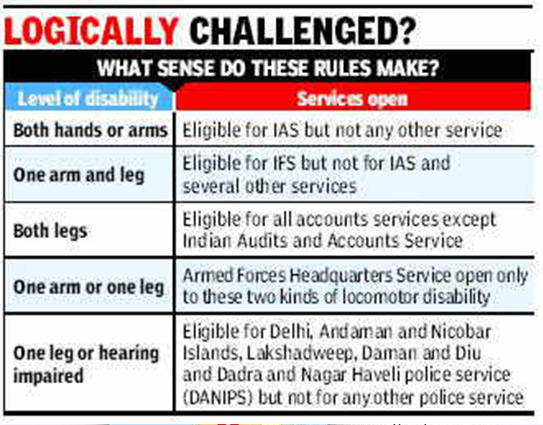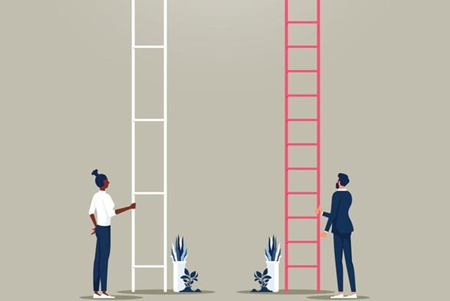QUOTAS, AND THE LIE OF MERITOCRACY THAT CONTINUES TO THRIVE IN INDIA
Relevance: GS 2 – Government policies and interventions for development in various sectors and issues arising out of their design and implementation. Welfare schemes for vulnerable sections of the population by the Centre and States and the performance of these schemes
Why in the news?
- Amartya Sen’s quote, “The idea of meritocracy may have many virtues, but clarity is not one of them,” highlights the complexities of meritocracy.
- IAS officer from Telangana, Smita Sabharwal, recently expressed concerns on ‘X’ regarding former trainee Puja Khedkar’s alleged misuse of disability quotas in the All India Services (AIS).
About the news
- Sabharwal questioned the necessity of quotas for the disabled in AIS, comparing the situation to an airline not hiring a pilot with a disability or trusting a surgeon with a disability.
- She argued that the nature of AIS roles, which involve fieldwork, long hours, and direct interaction with people, demands physical fitness, implying that such positions may not be suitable for individuals with disabilities.
- Her comments sparked a debate, with some supporting her viewpoint and others criticizing it as exclusionary and insensitive.
Critique of No Disability quota in AIS
- Exclusivity and Exclusion: By labeling the IAS as a “premier service” Sabharwal implicitly places herself in an exclusive group that seemingly excludes the differently abled, suggesting they are collectively ineligible for hard work.
- Misunderstanding Disabilities: Sabharwal’s comment overlooks the varying degrees of disability. Many differently abled individuals can effectively engage in roles requiring long hours of listening, unless they are hearing impaired. Mobility challenges can be addressed with advanced equipment like wheelchairs used in tennis tournaments.
- Overlooking Capabilities: The upcoming Paralympic Games in Paris (starting Aug 28) showcase the significant physical exertion that differently abled individuals are capable of if one observed the event.
- Underlying Issue of Meritocracy: Although Sabharwal doesn’t explicitly mention merit, her critique of quotas hints at a belief in meritocracy. The concept of meritocracy, while often seen as a fair system, is increasingly questioned in the US and Europe due to its potential flaws. Despite this, India continues to hold onto meritocracy as an ideal way to organize society.
Origins and Critique of Meritocracy:
- Coining of ‘Meritocracy’: The term “meritocracy” was coined in the 1950s by British sociologist Alan Fox to describe a dystopian world, rather than a utopian society where social hierarchies are eliminated.
- Popularization by Michael Young: British sociologist Michael Young popularized the term with his satirical book “The Rise of the Meritocracy.”
- In this book, the educated elite view themselves as inherently more valuable than the underclass, leading to a dystopian society where, by 2034, the underclass (ironically called the ‘populists’) rebel against the meritocrats.
- Inherent Contradictions: Scholars like James Flynn have highlighted the contradictions in a society based on merit.
- Initially, merit was meant to counter the aristocratic elite who monopolized wealth and power.
- However, when merit becomes the criterion for distributing wealth and power, it results in a new hierarchy, mirroring the flaws of an aristocracy, including the emergence of social elites.
- Michael Sandel’s Critique: In his book “Tyranny of Merit: What’s Become of the Common Good?”, Harvard philosophy professor Michael Sandel discusses how measures of merit are often intertwined with economic advantage.
- He cites the 2019 scandal in the US where a consultant used unethical means to secure top university admissions for the children of wealthy celebrities.
- Sandel argues that standardized tests like the SAT, which claim to measure merit, often correlate with family income, as wealthier families can afford extensive test preparation and private admissions counselors.
Meritocracy in India:
- Exam Prep Industry: In India, exam preparation industries churn out students who excel in NEET, JEE, and UPSC exams.
- However, this system often favors those who can afford expensive coaching, leading to a situation where top institutions like IITs receive students skilled at gaming the system rather than the brightest minds.
- Exceptions exist, with some students from disadvantaged backgrounds succeeding, but they are few and far between.
- Sandel’s Argument: Michael Sandel argues that the actions of celebrity parents in the US college admissions scandal were not merely about securing a better life for their children.
- They were buying the “borrowed luster of merit,” seeking to justify their success in an unequal society as morally deserved.
- Merit’s Pitfalls: While merit is a necessary framework for organizing society, it has significant pitfalls, including the potential to perpetuate inequality. Therefore, it must be balanced with compassion and empathy.
- Disability and Competence: An IAS officer, or anyone in a position of power, should recognize that disability does not equate to a lack of competence, skill, or intelligence. While the differently abled may face certain limitations, such as flying planes, it is crucial not to restrict their potential with the paradoxes of merit.
Way Forward: Addressing Quotas and Meritocracy in India
- Promote Inclusive Policies: Develop clear guidelines that outline the capabilities and adaptations available for differently abled individuals in various roles.
- Awareness and Sensitization: Conduct workshops and training sessions for civil servants and policymakers to raise awareness about the capabilities of differently abled individuals.
- Reevaluate Meritocratic Standards: Critically assess the criteria used to define merit in competitive examinations and civil service roles, ensuring they are equitable and do not favor those with greater resources.
- Encourage Diverse Pathways: Promote diverse pathways to success in civil services, recognizing that talent and capability can manifest in various forms beyond traditional metrics. Support initiatives that provide coaching and resources to underprivileged and differently abled candidates to level the playing field.
- Foster a Culture of Compassion: Cultivate a societal mindset that values empathy and understanding over rigid definitions of merit. Encourage discussions on the importance of balancing merit with compassion to create a more equitable society.
- Engage in Continuous Dialogue: Facilitate ongoing discussions among stakeholders, including government officials, civil society, and differently abled individuals, to address concerns and share perspectives on quotas and meritocracy.
- Create forums for feedback and policy adjustments based on the experiences and needs of differently abled individuals in the workforce.
Alternative articles
https://universalinstitutions.com/not-by-a-single-exam-resolving-indias-examination-crisis/
https://universalinstitutions.com/reservation-a-vital-tool-for-equality-and-respect/
Mains question
Critically analyze the concept of meritocracy, discussing its potential to perpetuate social inequalities. How can meritocracy be balanced with inclusivity and empathy in the context of public services? (250 words)





